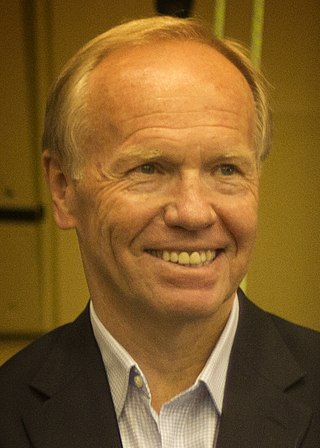
Peter Douglas Beattie is an Australian former politician who served as the 36th Premier of Queensland, in office from 1998 to 2007. He was the state leader of the Labor Party from 1996 to 2007.
In Australia, referendums are public votes held on important issues where the electorate may approve or reject a certain proposal. In contemporary usage, polls conducted on non-constitutional issues are known as plebiscites, with the term referendum being reserved solely for votes on constitutional changes, which is legally required to make a change to the Constitution of Australia.

Anna Maria Bligh is a lobbyist and former Australian politician who served as the 37th Premier of Queensland, in office from 2007 to 2012 as leader of the Queensland Labor Party. She was the first woman to hold either position. In 2017, she was appointed CEO of the Australian Banking Association.

Australia uses three main time zones: Australian Eastern Standard Time, Australian Central Standard Time and Australian Western Standard Time.

Gaven is an electoral district of the Legislative Assembly in the Australian state of Queensland. It was created out of the former district of Nerang and the southern segment of Albert in the 2001 redistribution, and encompasses the northern growth corridor of the Gold Coast. The current Member of Parliament is Meaghan Scanlon of the Labor Party. It is currently the only Labor-held seat on the Gold Coast.
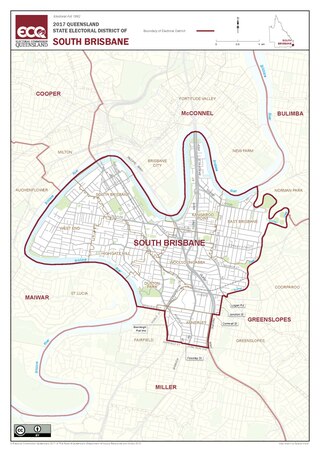
South Brisbane, also known as Brisbane South, is an electoral district of the Legislative Assembly of Queensland. The electorate encompasses suburbs in Brisbane's inner-south, stretching from East Brisbane to West End, and south to Annerley. Parts of Greenslopes and Coorparoo are also located in the electorate.
Peter Lawlor is a former Labor Member for Southport in the Queensland Legislative Assembly. He served as Queensland Minister for Tourism and Fair Trading. Prior to his term in state parliament he previously served as a councillor on the Gold Coast City Council.
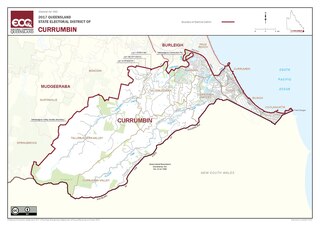
Currumbin is an electoral district of the Legislative Assembly in the Australian state of Queensland.

The 2009 Queensland state election was held on 21 March 2009 to elect all 89 members of the Legislative Assembly, a unicameral parliament.

The 2012 Queensland state election was held on 24 March 2012 to elect all 89 members of the Legislative Assembly, a unicameral parliament.
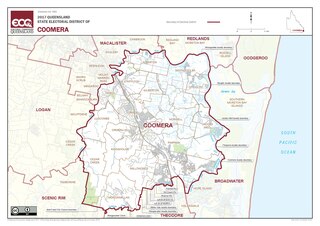
Coomera is an electoral district of the Legislative Assembly in the Australian state of Queensland, based at the northern end of the Gold Coast. The seat has been held by the Liberal National Party since its establishment in 2009.
The 2009 Western Australian daylight saving referendum was held on 16 May 2009 in the Australian state of Western Australia to decide if daylight saving time should be adopted. It was the fourth such proposal which had been put to Western Australian voters and followed a three-year trial period. The referendum resulted in the proposal being rejected, with 54.56% voting against the proposal.
The Daylight Saving for South East Queensland Referendum Bill 2010 was a bill tabled in the Queensland Parliament on 14 April 2010, by Independent Member Peter Wellington. Wellington had called for a referendum to be held at the next State election on introduction of daylight saving time for South East Queensland. The Bill proposed a split-time zone for the state of Queensland and had suggested that the local government areas of Brisbane, Gold Coast, Sunshine Coast, Ipswich, Logan, Scenic Rim, Redland and Moreton Bay be included in the daylight saving time zone, while the rest of the state remains on standard time.

Daylight saving time was trialled in the state of Queensland, Australia, during the 1989/90 season, with the trial extended for a further two years—1990/91 and 1991/92. The last full day of daylight saving in Queensland was Saturday 29 February 1992, with clocks officially wound back an hour on Sunday 1 March at 3am.

Each state and territory of Australia determines whether or not to use daylight saving time (DST). However, during World War I and World War II all states and territories had daylight saving by federal law, under the defence power in section 51 of the constitution. In 1968, Tasmania was the first state since the war to adopt daylight saving. In 1971, New South Wales, Queensland, South Australia, Victoria, and the Australian Capital Territory also adopted daylight saving, while Western Australia and the Northern Territory did not. Queensland abandoned daylight saving in 1972. Queensland and Western Australia have observed daylight saving over the past 40 years from time to time on a trial basis.
Parts of Australia, New Zealand and Fiji are areas of Oceania that currently observe daylight saving time (DST).
The Electoral Commission of Queensland (ECQ) is established under the Electoral Act 1992 as an independent statutory authority, responsible for the impartial conduct of state and local government elections in Queensland.
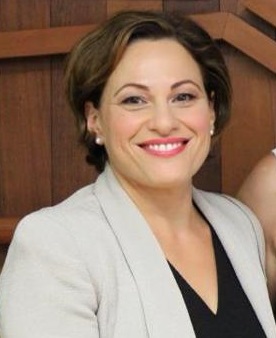
A by-election was held for the seat of South Brisbane in the Legislative Assembly of Queensland on 28 April 2012, the same day as local government elections, following the decision of former Premier Anna Bligh to retire from politics. Jackie Trad retained the seat for the Labor Party.
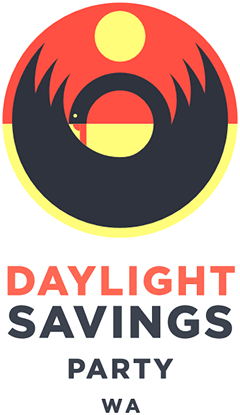
The Daylight Saving Party is an Australian political party in Western Australia. It was founded in September 2016 by brothers Brett and Wilson Tucker. It was registered as a political party on 29 November 2016. The party was deregistered in February 2023, but remains active.

Wilson Robert Tucker is an Australian politician serving in the Western Australian Legislative Council for the Mining and Pastoral region. He was elected at the 2021 Western Australian state election for the Daylight Saving Party, with 98 primary votes, or 0.18% of the vote – believed to be the lowest primary vote for any politician elected to a parliament in Australia.













